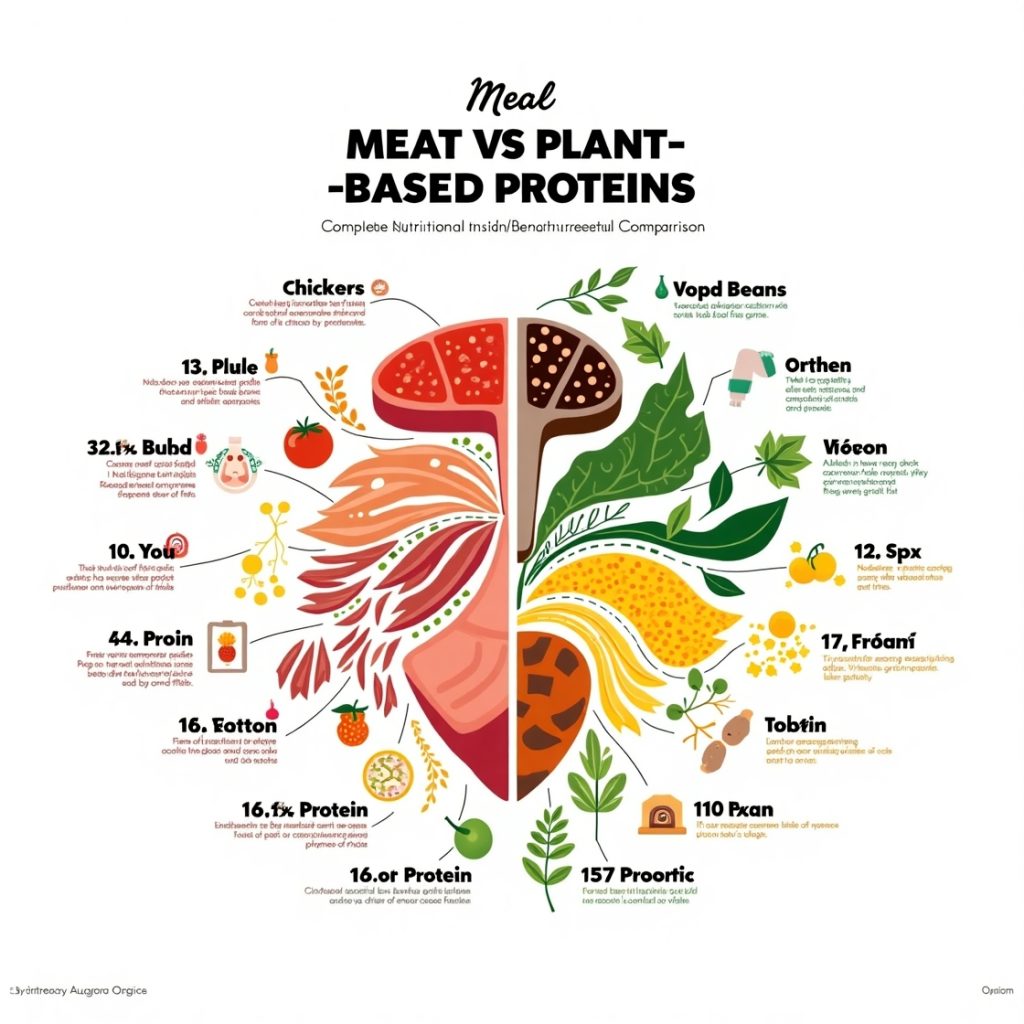Meat vs Plant-Based Proteins: A Comprehensive Comparison for 2025
As the debate between animal and plant-based proteins continues, understanding their differences in nutrition, environmental impact, and practical applications becomes increasingly important. This guide provides a detailed comparison to help you make informed dietary choices.
Nutritional Comparison
Protein Content (per 100g):
- Animal Proteins:
- Chicken Breast: 31g
- Beef (lean): 26g
- Fish (salmon): 25g
- Eggs: 13g
- Plant Proteins:
- Tempeh: 19g
- Seitan: 25g
- Lentils (cooked): 9g
- Quinoa (cooked): 4.4g
Essential Amino Acids:
- Animal Proteins:
- Complete amino acid profile
- Better iron absorption
- Natural B12 source
- Higher protein density
- Plant Proteins:
- May need combining for completeness
- Lower biological value
- Variable absorption rates
- Strategic pairing recommended
Additional Nutrients
Animal Protein Benefits:
- Vitamins:
- B12 (not in plants)
- D3 (active form)
- Heme iron
- Zinc
- Other Nutrients:
- Creatine
- Carnosine
- DHA/EPA omega-3s
- Conjugated linoleic acid
Plant Protein Benefits:
- Nutrients:
- Fiber
- Antioxidants
- Phytochemicals
- Plant sterols
- Additional Benefits:
- Lower saturated fat
- Zero cholesterol
- Higher mineral content
- Prebiotics
Environmental Impact
Carbon Footprint (per kg of protein):
- Animal Proteins:
- Beef: 60 kg CO2e
- Pork: 24 kg CO2e
- Chicken: 16 kg CO2e
- Fish (farmed): 13 kg CO2e
- Plant Proteins:
- Tofu: 3 kg CO2e
- Legumes: 2 kg CO2e
- Nuts: 4 kg CO2e
- Seitan: 2.5 kg CO2e
Resource Usage (per kg of protein):
- Water Consumption:
- Beef: 15,400 liters
- Chicken: 4,325 liters
- Tofu: 925 liters
- Legumes: 1,250 liters
- Land Use:
- Beef: 163 m²
- Pork: 17 m²
- Legumes: 3.4 m²
- Nuts: 8.2 m²
Cost Comparison (2025 Average Prices)
Animal Proteins (per pound):
- Ground Beef: $5.99-7.99
- Chicken Breast: $4.99-6.99
- Pork Loin: $4.49-6.49
- Salmon: $9.99-14.99
Plant Proteins (per pound):
- Tofu: $2.99-3.99
- Tempeh: $3.99-5.99
- Dried Lentils: $1.99-2.99
- Seitan: $4.99-6.99
Cooking and Preparation
Animal Proteins:
- Advantages:
- Natural flavor
- Easy to cook
- Familiar texture
- Versatile preparation methods
- Considerations:
- Food safety concerns
- Proper temperature needed
- Storage requirements
- Cross-contamination risks
Plant Proteins:
- Advantages:
- Longer shelf life
- No food safety risks
- More sustainable storage
- Lower cooking temperatures
- Considerations:
- May need seasoning expertise
- Texture adaptation required
- Soaking/preparation time
- Different cooking techniques
Health Considerations
Benefits of Animal Proteins:
- Complete protein profile
- Better iron absorption
- Natural B12 source
- Higher protein density
Benefits of Plant Proteins:
- Lower in saturated fat
- Higher in fiber
- More antioxidants
- Better for heart health
Practical Applications
Best Uses for Animal Proteins:
- Athletic Performance:
- Muscle building
- Post-workout recovery
- Strength training
- Specific Diets:
- Ketogenic
- Paleo
- High-protein
Best Uses for Plant Proteins:
- Health Goals:
- Weight management
- Heart health
- Digestive health
- Dietary Preferences:
- Vegan/vegetarian
- Environmental concerns
- Religious restrictions
Making the Choice
Choose Animal Proteins If:
- You prioritize complete protein sources
- You’re focused on muscle building
- You need higher iron intake
- You prefer traditional cooking methods
Choose Plant Proteins If:
- You’re environmentally conscious
- You’re watching cholesterol intake
- You want higher fiber intake
- You’re on a budget
The ideal approach for many people in 2025 is a balanced combination of both protein sources, taking advantage of the unique benefits each offers while minimizing their respective drawbacks. Consider your personal health goals, environmental values, and dietary preferences when making your choice.

